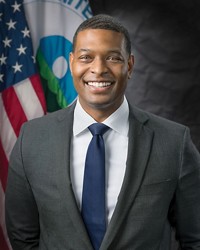Advertisement
Grab your lab coat. Let's get started
Welcome!
Welcome!
Create an account below to get 6 C&EN articles per month, receive newsletters and more - all free.
It seems this is your first time logging in online. Please enter the following information to continue.
As an ACS member you automatically get access to this site. All we need is few more details to create your reading experience.
Not you? Sign in with a different account.
Not you? Sign in with a different account.
ERROR 1
ERROR 1
ERROR 2
ERROR 2
ERROR 2
ERROR 2
ERROR 2
Password and Confirm password must match.
If you have an ACS member number, please enter it here so we can link this account to your membership. (optional)
ERROR 2
ACS values your privacy. By submitting your information, you are gaining access to C&EN and subscribing to our weekly newsletter. We use the information you provide to make your reading experience better, and we will never sell your data to third party members.
Policy
Grant recipients barred as U.S. EPA advisers
Agency chief makes room for more industry scientists
by Cheryl Hogue
November 1, 2017
| A version of this story appeared in
Volume 95, Issue 44

In an unprecedented shift, panels that provide science advice to the U.S. Environmental Protection Agency will have fewer academic scientists and more industry experts and state regulators.
Under an Oct. 31 directive from EPA Administrator Scott Pruitt, people will no longer be able to serve on three scientific advisory boards while they receive EPA research funding. Dozens of academics have historically served as external EPA advisers, along with a smattering of scientists from industry and state regulators.
Pruitt says the move will ensure that the advisers are financially independent from the agency.
The changes “suggest a profound misunderstanding of how scientific grants are awarded and how science is conducted,” says Sen. Chris Coons (D-Del.), a member of the Senate Chemistry Caucus. “To suggest that academic scientists personally profit from grants they receive to conduct research while representatives of regulated industries do not benefit from how regulations are implemented is extremely disingenuous.”
“Leading scientific experts who are conducting environmental science research should not be prohibited from participating on EPA science advisory boards and committees if they have met the appropriate financial conflict of interest policy,” says the American Association for the Advancement of Science.
But Republican leaders in Congress applaud Pruitt’s action. They include Rep. Lamar Smith of Texas, chair of the House of Representatives’ Science, Space & Technology Committee, who has long supported legislation to forbid grant recipients from serving as EPA advisors.
As of September, 22 of the 47 members on the agency’s flagship Science Advisory Board (SAB) had received EPA grants at some time in the past, although not all of them currently receive EPA research funds, according to an analysis by the Union of Concerned Scientists. SAB provides advice on a broad array of issues including chemical safety, water pollution, and cleanup of contaminated land.
Pruitt says the members of the agency’s advisory boards will now be chosen to reflect geographic diversity. In contrast, technical expertise was the primary concern in EPA’s choice of advisers for decades under both Republican and Democratic administrations.
To chair the SAB, Pruitt tapped Michael E. Honeycutt, who directs the Texas Commission on Environmental Quality’s toxicology division. Honeycutt has long criticized EPA’s scientific assessments of chemicals as too stringent. Under Honeycutt’s leadership, the Texas agency has conducted its own assessments of chemicals, many of them air pollutants, and concluded that the substances are less toxic than EPA determined. Honeycutt endorsed the concept of barring EPA grant recipients from serving on the SAB in a 2013 testimony before Congress.
Pruitt selected Tony Cox, who runs a Denver business analytics consulting company to chair the Clean Air Scientific Advisory Board, which focuses on air pollution issues. Paul Gilman, chief sustainability officer of Covanta, a waste management and incineration firm, is the new chair of the Board of Scientific Counselors, which reviews EPA’s in-house research. Gilman headed EPA’s Office of Research & Development for two years during the administration of President George W. Bush.



Join the conversation
Contact the reporter
Submit a Letter to the Editor for publication
Engage with us on Twitter